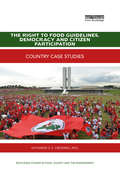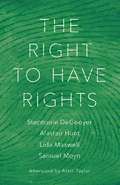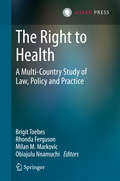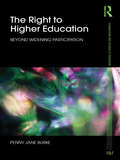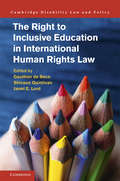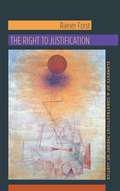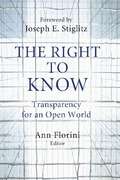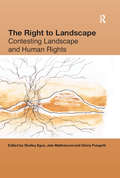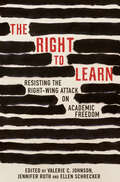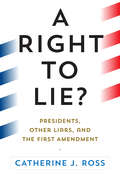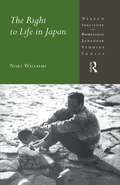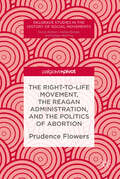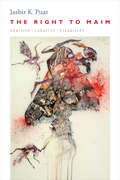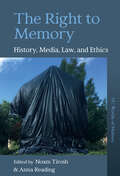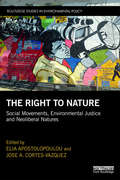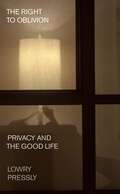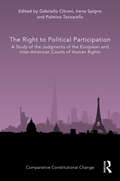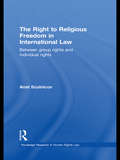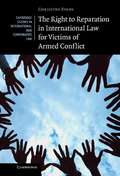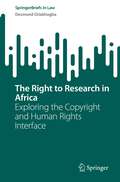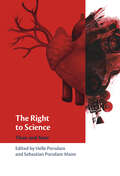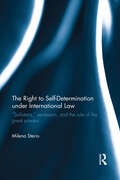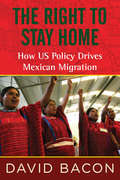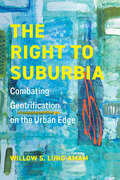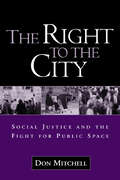- Table View
- List View
The Right to Food Guidelines, Democracy and Citizen Participation: Country case studies (Routledge Studies in Food, Society and the Environment)
by Katharine S. Cresswell RiolIt is now more than a decade since the Right to Food Guidelines were negotiated, agreed and adopted internationally by states. This book provides a review of its objectives and the extent of success of its implementation. The focus is on the first key guideline – "Democracy, good governance, human rights and the rule of law" – with an emphasis on civil society participation in global food governance. The five BRICS countries (Brazil, Russia, India, China and South Africa) are presented as case studies: representing major emerging economies, they blur the line between the Global North and South, and exhibit different levels of human rights realisation. The book first provides an overview of the right to adequate food, accountability and democracy, and an introduction to the history of the development of the right to adequate food and the Right to Food Guidelines. It presents a historical synopsis of each of the BRICS states’ experiences with the right to adequate food and an analysis of their related periodic reporting to the Committee on Economic, Social and Cultural Rights, as well as a specific assessment of their progress in regard to the first guideline. The discussion then focuses on the effectiveness of the Right to Food Guidelines as both a policy-making and monitoring tool, based on the analysis of the guidelines and the BRICS states.
The Right to Have Rights
by Stephanie DeGooyer Alastair Hunt Lida Maxwell Samuel Moyn Astra TaylorFive leading thinkers on the concept of ‘rights’ in an era of rightlessnessSixty years ago, the political theorist Hannah Arendt, an exiled Jew deprived of her German citizenship, observed that before people can enjoy any of the “inalienable” Rights of Man—before there can be any specific rights to education, work, voting, and so on—there must first be such a thing as “the right to have rights.” The concept received little attention at the time, but in our age of mass deportations, Muslim bans, refugee crises, and extra-state war, the phrase has become the center of a crucial and lively debate. Here five leading thinkers from varied disciplines—including history, law, politics, and literary studies—discuss the critical basis of rights and the meaning of radical democratic politics today.
The Right to Health
by Brigit Toebes Rhonda Ferguson Milan M. Markovic Obiajulu NnamuchiThis interdisciplinary study engages with the fields of human rights law, health law, and public health. It analyses how the internationally guaranteed human 'right to health' is realized by States at a national level. It brings together scholars from more than ten different countries, with each of them analyzing the right to health in their country or region. They all focus on a particular theme that is important in their country, such as health inequalities, the Millennium Development Goals, or the privatization of healthcare. This book is relevant for scholars, practitioners and policy makers in the field of human rights law, health law, public health and the intersection between these three fields.
The Right to Higher Education: Beyond widening participation (Foundations and Futures of Education)
by Penny Jane BurkeThe landscape of higher education has undergone change and transformation in recent years, partly as a result of diversification and massification. However, persistent patterns of under-representation continue to perplex policy-makers and practitioners, raising questions about current strategies, policies and approaches to widening participation. Presenting a comprehensive review and critique of contemporary widening participation policy and practice, Penny Jane Burke interrogates the underpinning assumptions, values and perspectives shaping current concepts and understandings of widening participation. She draws on a range of perspectives within the field of the sociology of education – including feminist post-structuralism, critical pedagogy and policy sociology – to examine the ways in which wider societal inequalities and misrecognitions, which are related to difference and diversity, present particular challenges for the project to widen participation in higher education. In particular, the book: focuses on the themes of difference and diversity to shed light on the operations of inequalities and the politics of access and participation both in terms of national and institutional policy and at the level of student and practitioner experience. draws on the insights of the sociology of education to consider not only the patterns of under-representation in higher education but also the politics of mis-representation, critiquing key discourses of widening participation. interrogates assumptions behind WP policy and practice, including assumptions about education being an unassailable good provides an analysis of the accounts and perspectives of students, practitioners and policy-makers through in-depth interviews, observations and reflective journal entries. offers insights for future developments in the policy, practice and strategies for widening participation The book will be of great use to all those working in and researching Higher Education.
The Right to Inclusive Education in International Human Rights Law (Cambridge Disability Law and Policy Series)
by Gauthier De Beco Shivaun Quinlivan Janet E. LordEducation is a fundamental human right that is recognised as essential for the attainment of all civil, political, economic, social and cultural rights. It was not until 2006, on the adoption of the UN Convention on the Rights of Persons with Disabilities (CRPD), that the right to inclusive education was codified. This volume fills a major gap in the literature on the right of disabled people to education. It examines the theoretical foundations and core content of the right to inclusive education in international human rights law, and explores the various ways of implementing this right through an exploration of legal strategies and mechanisms. With contributions by leaders in the field, this volume advances scholarship on the core content of the right to inclusive education by examining the content and practice of the right at the national, regional and international levels.
The Right to Justification: Elements of a Constructivist Theory of Justice (New Directions in Critical Theory #46)
by Rainer ForstContemporary philosophical pluralism recognizes the inevitability and legitimacy of multiple ethical perspectives and values, making it difficult to isolate the higher-order principles on which to base a theory of justice. Rising up to meet this challenge, Rainer Forst, a leading member of the Frankfurt School's newest generation of philosophers, conceives of an "autonomous" construction of justice founded on what he calls the basic moral right to justification.Forst begins by identifying this right from the perspective of moral philosophy. Then, through an innovative, detailed critical analysis, he ties together the central components of social and political justice-freedom, democracy, equality, and toleration-and joins them to the right to justification. The resulting theory treats "justificatory power" as the central question of justice, and by adopting this approach, Forst argues, we can discursively work out, or "construct," principles of justice, especially with respect to transnational justice and human rights issues. As he builds his theory, Forst engages with the work of Anglo-American philosophers such as John Rawls, Ronald Dworkin, and Amartya Sen, and critical theorists such as Jürgen Habermas, Nancy Fraser, and Axel Honneth. Straddling multiple subjects, from politics and law to social protest and philosophical conceptions of practical reason, Forst brilliantly gathers contesting claims around a single, elastic theory of justice.
The Right to Know: Transparency for an Open World (Initiative for Policy Dialogue at Columbia: Challenges in Development and Globalization)
by Ann FloriniThe Right to Know is a timely and compelling consideration of a vital question: What information should governments and other powerful organizations disclose? Excessive secrecy corrodes democracy, facilitates corruption, and undermines good public policymaking, but keeping a lid on military strategies, personal data, and trade secrets is crucial to the protection of the public interest. Over the past several years, transparency has swept the world. India and South Africa have adopted groundbreaking national freedom of information laws. China is on the verge of promulgating new openness regulations that build on the successful experiments of such major municipalities as Shanghai. From Asia to Africa to Europe to Latin America, countries are struggling to overcome entrenched secrecy and establish effective disclosure policies. More than seventy now have or are developing major disclosure policies or laws. But most of the world's nearly 200 nations do not have coherent disclosure laws; implementation of existing rules often proves difficult; and there is no consensus about what disclosure standards should apply to the increasingly powerful private sector. As governments and corporations battle with citizens and one another over the growing demand to submit their secrets to public scrutiny, they need new insights into whether, how, and when greater openness can serve the public interest, and how to bring about beneficial forms of greater disclosure. The Right to Know distills the lessons of many nations' often bitter experience and provides careful analysis of transparency's impact on governance, business regulation, environmental protection, and national security. Its powerful lessons make it a critical companion for policymakers, executives, and activists, as well as students and scholars seeking a better understanding of how to make information policy serve the public interest.
The Right to Landscape: Contesting Landscape and Human Rights
by Shelley Egoz, Jala Makhzoumi and Gloria PungettiAssociating social justice with landscape is not new, yet the twenty-first century's heightened threats to landscape and their impact on both human and, more generally, nature's habitats necessitate novel intellectual tools to address such challenges. This book offers that innovative critical thinking framework. The establishment of the Universal Declaration of Human Rights (UDHR) in 1948, in the aftermath of Second World War atrocities, was an aspiration to guarantee both concrete necessities for survival and the spiritual/emotional/psychological needs that are quintessential to the human experience. While landscape is place, nature and culture specific, the idea transcends nation-state boundaries and as such can be understood as a universal theoretical concept similar to the way in which human rights are perceived. The first step towards the intellectual interface between landscape and human rights is a dynamic and layered understanding of landscape. Accordingly, the 'Right to Landscape' is conceived as the place where the expansive definition of landscape, with its tangible and intangible dimensions, overlaps with the rights that support both life and human dignity, as defined by the UDHR. By expanding on the concept of human rights in the context of landscape this book presents a new model for addressing human rights - alternative scenarios for constructing conflict-reduced approaches to landscape-use and human welfare are generated. This book introduces a rich new discourse on landscape and human rights, serving as a platform to inspire a diversity of ideas and conceptual interpretations. The case studies discussed are wide in their geographical distribution and interdisciplinary in the theoretical situation of their authors, breaking fresh ground for an emerging critical dialogue on the convergence of landscape and human rights.
The Right To Learn: Resisting the Right-Wing Attack on Academic Freedom
by Jennifer RuthFrom leaders on the front lines of the battle for academic freedom in higher education, an empowering collection on fighting back against anti-CRT policies, book banning, and moreSpanning over 40 years of contested history through to today, The Right to Learn speaks out fearlessly against the far right&’s decades-long war against intellectual freedom. This essential anthology outlines and contextualizes the culture wars&’ demonization of critical race theory, Ron DeSantis&’s &“Don&’t Say Gay&” law, and other hot-button issues.With an introduction that places the current crisis within the broader context of the ongoing attacks on American democracy, The Right to Learn features the testimony and analysis of activists, scholars, and attorneys with first-hand experience in the struggle against well-funded conservative groups&’ assaults on academic freedom. An impassioned, inspired resource for those fighting on the ground for the right to learn, this anthology is structured in three parts designed to equip educators with the necessary tools to understand the battle—and to fight back.—PART 1 explores educational gag laws, featuring, among others, PEN America staff members Jonathan Friedman, Jeremy C. Young, and James Tager.—PART 2 offers perspectives on key issues from those on the front lines: activists, educators, and attorneys like Dennis Parker, director of the National Center for Law and Economic Justice.—PART 3 investigates the implications of undermining academic freedom, with insight from experts such as Sharon D. Wright Austin, one of the professors barred by the University of Florida from testifying against a restrictive voting rights law and a plaintiff in the main legal case against Ron DeSantis&’s &“Stop WOKE Act.&”As they confront today&’s attack on higher education, The Right to Learn&’s expert contributors reveal that what&’s at stake is the pursuit of the real-world and contemporary knowledge a democratic polity requires.
A Right to Lie?: Presidents, Other Liars, and the First Amendment
by Catherine J. RossIn A Right to Lie?, legal scholar Catherine J. Ross addresses the urgent issue of whether the nation's highest officers, including the president, have a right to lie under the Speech Clause, no matter what damage their falsehoods cause. Does freedom of expression protect even factual falsehoods? If so, are lies by candidates and public officials protected? And is there a constitutional path, without violating the First Amendment, to stop a president whose persistent lies endanger our lives and our democracy?Perhaps counter-intuitively, the general answer to each question is "yes." Drawing from dramatic court cases about defamers, proponents of birtherism, braggarts, and office holders, Ross reveals the almost insurmountable constitutional and practical obstacles to legal efforts to rein in public deception. She explains the rules that govern the treatment of lies, while also demonstrating the incalculable damage presidential mendacity may lead to, as revealed in President Trump's lies about the COVID-19 pandemic and the legitimacy of the 2020 election.Falsehoods have been at issue in every presidential impeachment proceeding from Nixon to Trump. But, until now, no one has analyzed why public lies might be impeachable offenses, and whether the First Amendment would provide a defense. Noting that speech by public employees does not receive the same First Amendment protection as the speech of ordinary citizens, Ross proposes the constitutionally viable solution of treating presidents as public employees who work for the people. Charged with oversight of the Executive, Congress may—and should—put future presidents on notice that material lies to the public on substantial matters will be deemed a "high crime and misdemeanor" subject to censure and even impeachment. A Right to Lie? explains how this approach could work if the political will were in place.
The Right to Life in Japan (Nissan Institute/Routledge Japanese Studies)
by Noel WilliamsThe Right to Life in Japan is a study that brings new perspectives to bear on an extremely important topic for all those facing the moral dilemmas of such issues as abortion and the death penalty. It also helps to fill a gap in life, in social science and law studies of contemporary Japan.Noel Williams approaches the right to life in Japan from a legal viewpoint via a broad range of issues such as abortion, suicide, capital punishment and death from overwork. Following a discussion of law and rights in Japan from an historical perspective, the author examines the question of what life is in contemporary Japan and focuses on problematic areas which have arisen in life issues, including infringements of the right to life within the modern company organization, and by the state, as well as the question of the equality of the right to life.
The Right-to-Life Movement, the Reagan Administration, and the Politics of Abortion (Palgrave Studies in the History of Social Movements)
by Prudence FlowersThis book offers a political, ideological, and social history of the national right-to-life movement in the 1980s under President Ronald Reagan. It analyzes anti-abortion engagement with the legislative, judicial, and executive branches, and offers what is frequently a narrative of disappointment and factionalism. The chapters explore pro-life responses to Supreme Court vacancies, attempts to pass a constitutional amendment, and broader legislative and bureaucratic strategies, including successful campaigns against international and domestic family planning programs. The book suggests that the 1980s transformed the anti-abortion cause, limiting the types of ideas and approaches possible at a national level. Although the movement later claimed Reagan as a "pro-life hero," while he was President right-to-lifers continuously struggled with the gap between his words and deeds. They also had a fraught relationship with the broader Republican Party. This book charts the political education of right-to-lifers, offering insights into social movement activism and conservatism in the late twentieth century.
The Right to Maim: Debility, Capacity, Disability
by Jasbir K. PuarIn The Right to Maim Jasbir K. Puar brings her pathbreaking work on the liberal state, sexuality, and biopolitics to bear on our understanding of disability. Drawing on a stunning array of theoretical and methodological frameworks, Puar uses the concept of “debility”—bodily injury and social exclusion brought on by economic and political factors—to disrupt the category of disability. She shows how debility, disability, and capacity together constitute an assemblage that states use to control populations. Puar's analysis culminates in an interrogation of Israel's policies toward Palestine, in which she outlines how Israel brings Palestinians into biopolitical being by designating them available for injury. Supplementing its right to kill with what Puar calls the right to maim, the Israeli state relies on liberal frameworks of disability to obscure and enable the mass debilitation of Palestinian bodies. Tracing disability's interaction with debility and capacity, Puar offers a brilliant rethinking of Foucauldian biopolitics while showing how disability functions at the intersection of imperialism and racialized capital.
The Right to Memory: History, Media, Law, and Ethics (Worlds of Memory #10)
by Noam Tirosh and Anna ReadingThe field of memory studies has typically focused on everyday memory and commemoration practices through which we construct meaning and identities. The Right to Memory looks beyond these everyday practices, focusing instead on how memory relates to human rights and socio-legal constructs in order to legitimize and protect groups and individuals. With case studies including Polish Holocaust Law, the Indian origins of Amartya Sen’s capability theory approach, and the right to memory through digital technologies in Brazilian and British museums, this collected volume seeks to establish the right to memory as a foundational topic in memory studies.
The Right to Nature: Social Movements, Environmental Justice and Neoliberal Natures (Routledge Studies in Environmental Policy)
by Elia Apostolopoulou Jose A. Cortes-VazquezSince the 2008 financial crash the expansion of neoliberalism has had an enormous impact on nature-society relations around the world. In response, various environmental movements have emerged opposing the neoliberal restructuring of environmental policies using arguments that often bridge traditional divisions between the environmental and labour agendas. The Right to Nature explores the differing experiences of a number of environmental-social movements and struggles from the point of view of both activists and academics. This collection attempts to both document the social-ecological impacts of neoliberal attempts to exploit non-human nature in the post-crisis context and to analyse the opposition of emerging environmental movements and their demands for a radically different production of nature based on social needs and environmental justice. It also provides a necessary space for the exchange of ideas and experiences between academics and activists and aims to motivate further academic-activist collaborations around alternative and counter-hegemonic re-thinking of environmental politics. This book will be of great interest to students, scholars and activists interested in environmental policy, environmental justice, social and environmental movements.
The Right to Oblivion: Privacy and the Good Life
by Lowry PresslyA visionary reexamination of the value of privacy in today’s hypermediated world—not just as a political right but as the key to a life worth living.The parts of our lives that are not being surveilled and turned into data diminish each day. We are able to configure privacy settings on our devices and social media platforms, but we know our efforts pale in comparison to the scale of surveillance capitalism and algorithmic manipulation. In our hyperconnected era, many have begun to wonder whether it is still possible to live a private life, or whether it is no longer worth fighting for.The Right to Oblivion argues incisively and persuasively that we still can and should strive for privacy, though for different reasons than we might think. Recent years have seen heated debate in the realm of law and technology about why privacy matters, often focusing on how personal data breaches amount to violations of individual freedom. Yet as Lowry Pressly shows, the very terms of this debate have undermined our understanding of privacy’s real value. In a novel philosophical account, Pressly insists that privacy isn’t simply a right to be protected but a tool for making life meaningful.Privacy deepens our relationships with others as well as ourselves, reinforcing our capacities for agency, trust, play, self-discovery, and growth. Without privacy, the world would grow shallow, lonely, and inhospitable. Drawing inspiration from the likes of Hannah Arendt, Jorge Luis Borges, and a range of contemporary artists, Pressly shows why we all need a refuge from the world: not a place to hide, but a psychic space beyond the confines of a digital world in which the individual is treated as mere data.
The Right to Political Participation: A Study of the Judgments of the European and Inter-American Courts of Human Rights (Comparative Constitutional Change)
by Gabriella Citroni, Irene Spigno, and Palmina TanzarellaThis book provides a comparative analysis of how judgments from the European Court of Human Rights (ECtHR) and the Inter-American Court of Human Rights (IACtHR) affect political participation and electoral justice at the national level. Looking at specific countries, the work analyses the legal impact the implementation of the ECtHR and the IACtHR judgments has, with a specific focus on cases in which the regional court concerned uses the “democratic argument,” that is, an argument related to democracy and political rights. The reasoning is that, although democracy is a much wider concept, judgments concerning violations of political rights and electoral justice provide reliable indicators to assess the status and sustainability of democracy in a State. Moreover, the analysis of the violations of political rights and electoral justice allows an in-depth comparison between the two regional human rights systems. Mindful of the broader scope of the fall-out generated by the non-implementation of judgments, including in socio-economic terms, the book includes a section exploring how judgments issued by the ECtHR and the IACtHR affect voters’ participation in the countries under their jurisdiction. To this end, an original dataset including the 47 Member States of the Council of Europe and the 20 countries which recognised the adjudicatory jurisdiction of the IACtHR is built. Multidisciplinary in aim and scope of analysis, the book will be an invaluable resource for researchers, academics, and policy-makers working in the areas of constitutional law, international human rights law, and political economy.
The Right to Religious Freedom in International Law: Between Group Rights and Individual Rights (Routledge Research In Human Rights Law Ser. #2)
by Anat ScolnicovThis book analyses the right to religious freedom in international law, drawing on an array of national and international cases. Taking a rigorous approach to the right to religious freedom, Anat Scolnicov argues that the interpretation and application of religious freedom must be understood as a conflict between individual and group claims of rights, and that although some states, based on their respective histories, religions, and cultures, protect the group over the individual, only an individualistic approach of international law is a coherent way of protecting religious freedom. Analysing legal structures in a variety of both Western and Non-Western jurisdictions, the book sets out a topography of different constitutional structures of religions within states and evaluates their compliance with international human rights law. The book also considers the position of women's religious freedom vis-à-vis community claims of religious freedom, of children’s right to religious freedom and of the rights of dissenters within religious groups.
The Right to Reparation in International Law for Victims of Armed Conflict
by Christine EvansIn this evaluation of the international legal standing of the right to reparation and its practical implementation at the national level, Christine Evans outlines State responsibility and examines the jurisprudence of the International Court of Justice, the Articles on State Responsibility of the International Law Commission and the convergence of norms in different branches of international law, notably human rights law, humanitarian law and international criminal law. Case studies of countries in which the United Nations has played a significant role in peace negotiations and post-conflict processes allow her to analyse to what extent transitional justice measures have promoted State responsibility for reparations, interacted with human rights mechanisms and prompted subsequent elaboration of domestic legislation and reparations policies. In conclusion, she argues for an emerging customary right for individuals to receive reparations for serious violations of human rights and a corresponding responsibility of States.
The Right to Research in Africa: Exploring the Copyright and Human Rights Interface (SpringerBriefs in Law)
by Desmond OriakhogbaThis book formulates a human right to research in Africa based on an in-depth examination of the available international and regional human rights instruments as well as those relevant to the national contexts of African countries. The imbalances in the African copyright ecosystem regarding access to information for research and education became painfully apparent during the COVID-19 pandemic. African libraries and knowledge curators found themselves ill-equipped to perform their role of enabling access to information. As teaching, learning and research are increasingly done on digital platforms, learners and researchers continue to grapple with the challenges of accessing materials owing largely to the protection of these resources under copyright law. Access to information, which is needed in order to exercise the right to science and culture, faces a significant challenge posed by the exercising of exclusive rights by copyright owners without a legal mechanism that properly balances copyright from a human rights perspective.To achieve such a balance, there is an urgent need to revise the African copyright system from the perspective of human rights law. Can it be done by establishing a human right to research? In view of the existing broad freedom of expression, and the right to science and culture, education, and property in global, national and regional human rights regimes, is a specific right to research in Africa necessary and justifiable? If so, what should its minimum core components be? Are there international and national regimes already in place that could support the formulation of a human right to research in Africa?This book offers a valuable resource for law- and policymakers in the fields of copyright and human rights, judges, lawyers, public interest groups, researchers and students, librarians and authors, as well as the general public.
The Right to Science: Then and Now
by Helle Porsdam Sebastian Porsdam MannThat everyone has a human right to enjoy the benefits of the progress of science and its applications comes as a surprise to many. Nevertheless, this right is pertinent to numerous issues at the intersection of science and society: open access; 'dual use' science; access to ownership and dissemination of data, knowledge, methods and the affordances and applications thereof; as well as the role of international co-operation, human dignity and other human rights in relation to science and its products. As we advance towards superintelligence, quantum computing, drone swarms, and life-extension technology, serious policy decisions will be made at the national and international levels. The human right to science provides an ideal tool to do so, backed up as it is by international law, political heft, and normative weight. This book is the first sustained attempt at turning this wonder of foresight into an actionable and justiciable right. This title is also available as Open Access on Cambridge Core.
The Right to Self-determination Under International Law: “Selfistans,” Secession, and the Rule of the Great Powers (Routledge Research in International Law)
by Milena SterioThis book proposes a novel theory of self-determination; the Rule of the Great Powers. This book argues that traditional legal norms on self-determination have failed to explain and account for recent results of secessionist self-determination struggles. While secessionist groups like the East Timorese, the Kosovar Albanians and the South Sudanese have been successful in their quests for independent statehood, other similarly situated groups have been relegated to an at times violent existence within their mother states. Thus, Chechens still live without significant autonomy within Russia, and the South Ossetians and the Abkhaz have seen their conflicts frozen because of the peculiar geo-political equilibrium of power within the Caucuses region. The Rule of the Great Powers, which asserts that only those self-determination seeking entities which enjoy the support of the majority of the most powerful states (the Great Powers) will ultimately have their rights to self-determination fulfilled. The Great Powers, potent military, economic and political powerhouses such as the United States, China, Russia, Japan, the United Kingdom, France, Germany, and Italy, often dictate self-determination outcomes through their influence in global affairs. Issues of self-determination in the modern world can no longer be effectively resolved through the application of traditional legal rules; rather, resort must be had to novel theories, such as the Rule of the Great Powers. This book will be of particular interest to academics and students of law, political science and international relations.
The Right to Stay Home: How US Policy Drives Mexican Migration
by David BaconThe story of the growing resistance of Mexican communities to the poverty that forces people to migrate to the United States People across Mexico are being forced into migration, and while 11 percent of that country's population lives north of the US border, the decision to migrate is rarely voluntary. Free trade agreements and economic policies that exacerbate and reinforce extreme wealth disparities make it impossible for Mexicans to make a living at home. And yet when they migrate to the United States, they must grapple with criminalization, low wages, and exploitation. In The Right to Stay Home, journalist David Bacon tells the story of the growing resistance of Mexican communities. Bacon shows how immigrant communities are fighting back--envisioning a world in which migration isn't forced by poverty or environmental destruction and people are guaranteed the "right to stay home." This richly detailed and comprehensive portrait of immigration reveals how the interconnected web of labor, migration, and the global economy unites farmers, migrant workers, and union organizers across borders. In addition to incisive reporting, eleven narratives are included, giving readers the chance to hear the voices of activists themselves as they reflect on their experiences, analyze the complexities of their realities, and affirm their vision for a better world.
The Right to Suburbia: Combating Gentrification on the Urban Edge
by Willow S Lung-AmamIn recent decades, American suburbs have undergone a so-called renaissance as multiple forces have transformed them into denser urban landscapes. Yet at the same time, suburban racial diversity, immigration, and poverty rates have surged. The Right to Suburbia investigates how marginalized communities in the suburbs of Washington, DC—one of the most intensely gentrifying metropolitan regions in the United States—have battled the uneven costs and benefits of redevelopment. Willow Lung-Amam narrates the efforts of activists, community groups, and political leaders fighting for communities' "right to suburbia"—that is, their right to stay put and benefit from new neighborhood investments. Revealing the far-reaching impacts of state-led redevelopment, The Right to Suburbia shows how patterns of unequal, racialized development and displacement are being produced and reproduced in suburbs—and how communities are fighting back.
Right to the City: Social Justice and the Fight for Public Space
by Don MitchellIn the wake of recent terrorist attacks, efforts to secure the American city have life-or-death implications. Yet demands for heightened surveillance and security throw into sharp relief timeless questions about the nature of public space, how it is to be used, and under what conditions. Blending historical and geographical analysis, this book examines the vital relationship between struggles over public space and movements for social justice in the United States. Presented are a series of linked cases that explore the judicial response to public demonstrations by early twentieth-century workers, and comparable legal issues surrounding anti-abortion protests today; the Free Speech Movement and the history of People's Park in Berkeley; and the plight of homeless people facing new laws against their presence in urban streets. The central focus is how political dissent gains meaning and momentum--and is regulated and policed--in the real, physical spaces of the city.
